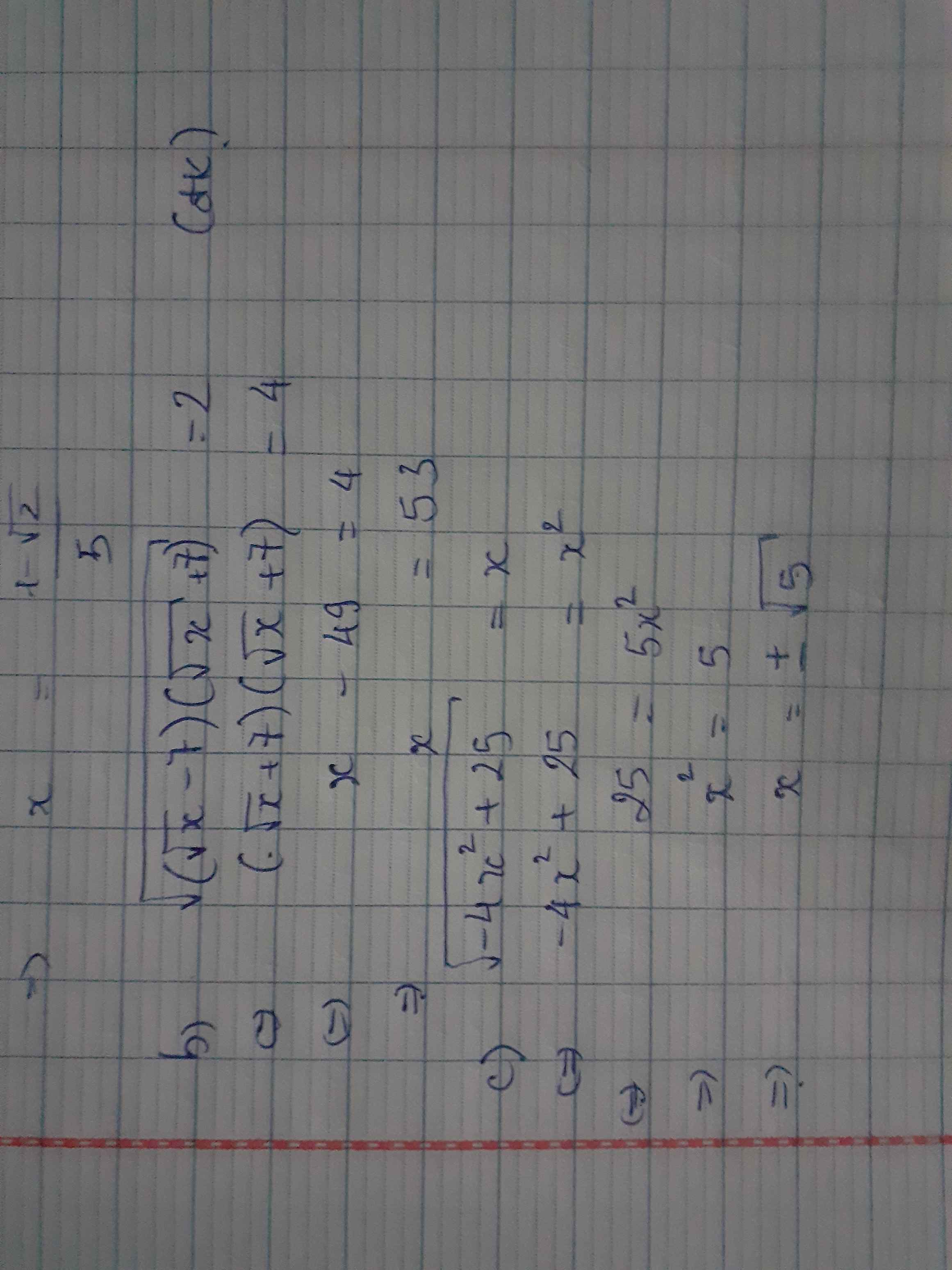\(\sqrt{5x^2+4x+7}\)

Những câu hỏi liên quan
giải phương trình:
a) \(\sqrt{4x^2+4x+3}=8\)
b) \(\sqrt{5x^3+5x^2+7}=9\)
c) \(\dfrac{3}{5}\sqrt{x^5+4x^3+2x^2}=18\)
a: Ta có: \(\sqrt{4x^2+4x+3}=8\)
\(\Leftrightarrow4x^2+4x+1+2-64=0\)
\(\Leftrightarrow4x^2+4x-61=0\)
\(\Delta=4^2-4\cdot4\cdot\left(-61\right)=992\)
Vì Δ>0 nên phương trình có hai nghiệm phân biệt là:
\(\left\{{}\begin{matrix}x_1=\dfrac{-4-4\sqrt{62}}{8}=\dfrac{-1-\sqrt{62}}{2}\\x_2=\dfrac{-4+4\sqrt{62}}{8}=\dfrac{-1+\sqrt{62}}{2}\end{matrix}\right.\)
Đúng 0
Bình luận (1)
7.\(\sqrt{3x-2}+\sqrt{x+1}=4x-9+2\sqrt{3x^2-5x+2}\)
Giải pt
\(1)4x^2+\sqrt{3x+1}+5=13x\)
\(2)7x^2-13x+8=2x^2.\sqrt[3]{x\left(1+3x-3x^2\right)}\)
\(3)x^3-4x^2-5x+6=\sqrt[3]{7x^2+9x-4}\)
\(4)x^3-5x^2+4x-5=\left(1-2x\right)\sqrt[3]{6x^2-2x+7}\)
\(5)8x^2-13x+7=\left(1+\dfrac{1}{x}\right)\sqrt[3]{3x^2-2}\)
Để giải các phương trình này, chúng ta sẽ làm từng bước như sau: 1. 13x(7-x) = 26: Mở ngoặc và rút gọn: 91x - 13x^2 = 26 Chuyển về dạng bậc hai: 13x^2 - 91x + 26 = 0 Giải phương trình bậc hai này để tìm giá trị của x. 2. (4x-18)/3 = 2: Nhân cả hai vế của phương trình với 3 để loại bỏ mẫu số: 4x - 18 = 6 Cộng thêm 18 vào cả hai vế: 4x = 24 Chia cả hai vế cho 4: x = 6 3. 2xx + 98x2022 = 98x2023: Rút gọn các thành phần: 2x^2 + 98x^2022 = 98x^2023 Chia cả hai vế cho 2x^2022: x + 49 = 49x Chuyển các thành phần chứa x về cùng một vế: 49x - x = 49 Rút gọn: 48x = 49 Chia cả hai vế cho 48: x = 49/48 4. (x+1) + (x+3) + (x+5) + ... + (x+101): Đây là một dãy số hình học có công sai d = 2 (do mỗi số tiếp theo cách nhau 2 đơn vị). Số phần tử trong dãy là n = 101/2 + 1 = 51. Áp dụng công thức tổng của dãy số hình học: S = (n/2)(a + l), trong đó a là số đầu tiên, l là số cuối cùng. S = (51/2)(x + (x + 2(51-1))) = (51/2)(x + (x + 100)) = (51/2)(2x + 100) = 51(x + 50) Vậy, kết quả của các phương trình là: 1. x = giá trị tìm được từ phương trình bậc hai. 2. x = 6 3. x = 49/48 4. S = 51(x + 50)
Đúng 0
Bình luận (0)
Giải phương trình:
1) \(3x^2+4x-3=4x\sqrt{4x-3}\)
2) \(\sqrt{x^2+2x}+\sqrt{x+2}=\sqrt{x}+\sqrt{x^2+2x-2}\)
3) \(\sqrt{3x+8}-\sqrt{3x+5}=\sqrt{5x-4}-\sqrt{5x-7}\)
4) \(\sqrt{7-x^2+x\sqrt{x+5}}=\sqrt{3-2x-x^2}\)
1/ \(3x^2+4x-3=4x\sqrt{4x-3}\)
\(\Leftrightarrow\left(4x^2-4x\sqrt{4x-3}+4x-3\right)-x^2=0\)
\(\Leftrightarrow\left(2x-\sqrt{4x-3}\right)^2-x^2=0\)
\(\Leftrightarrow\left(3x-\sqrt{4x-3}\right)\left(x-\sqrt{4x-3}\right)=0\)
\(\Leftrightarrow\left[\begin{matrix}3x=\sqrt{4x-3}\\x=\sqrt{4x-3}\end{matrix}\right.\)
\(\Leftrightarrow\left[\begin{matrix}9x^2-4x+3=0\\x^2-4x+3=0\end{matrix}\right.\)
\(\Leftrightarrow\left[\begin{matrix}x=1\\x=3\end{matrix}\right.\)
Đúng 0
Bình luận (0)
3.\(pt\Leftrightarrow\sqrt{3x+8}-\sqrt{3x+5}=\sqrt{5x-4}-\sqrt{5x-7}\)
\(\Leftrightarrow\frac{3x+8-5x+4}{\sqrt{3x+8}+\sqrt{5x+4}}-\frac{3x+5-5x+7}{\sqrt{3x+5}+\sqrt{5x+7}}=0\)
\(\Leftrightarrow\left(12-2x\right)\left(\frac{1}{\sqrt{3x+8}+\sqrt{5x+4}}+\frac{1}{\sqrt{3x+5}+\sqrt{5x+7}}\right)=0\)
\(\Rightarrow x=6\)
Đúng 0
Bình luận (0)
Giải phương trình sau:
1, \(\sqrt{5x+3}\) = \(\sqrt{3-\sqrt{2}}\)
2, \(\sqrt{\left(\sqrt{x}-7\right)\left(\sqrt{x}+7\right)}\) = 2
3,\(\sqrt{-4x^2+25}=x\)
1. ĐKXĐ: $x\geq \frac{-3}{5}$
PT $\Leftrightarrow 5x+3=3-\sqrt{2}$
$\Leftrightarrow x=\frac{-\sqrt{2}}{5}$
Đúng 1
Bình luận (0)
2. ĐKXĐ: $x\geq \sqrt{7}$
PT $\Leftrightarrow (\sqrt{x}-7)(\sqrt{x}+7)=4$
$\Leftrightarrow x-49=4$
$\Leftrightarrow x=53$ (thỏa mãn)
Đúng 2
Bình luận (0)
Xem thêm câu trả lời
Bài 1: Giải phương trình
1) \(\sqrt{4x^2+12x+9}=2-x\left(vớix\le0\right)\)
2) \(\sqrt{x^4+2x^2+1}=x^2+5x+4\) ( với \(x^2+5x+4>0\))
3) \(\sqrt{5x+1}=4\)
4) \(\sqrt{3-x}=7\)
Câu 2,3,4 nx thôi ạ. Câu 1 có bạn giúp r ạ
Đúng 0
Bình luận (0)
1)\(\sqrt{4x^2+12x+9}=2-x\)
\(\Leftrightarrow\sqrt{\left(2x+3\right)^2}=2-x\)
\(\Leftrightarrow\left|2x+3\right|=2-x\)
\(\Leftrightarrow\left[{}\begin{matrix}2x+3=2-x\\2x+3=x-2\end{matrix}\right.\Leftrightarrow\left[{}\begin{matrix}3x=-1\\x=-5\end{matrix}\right.\Leftrightarrow\left[{}\begin{matrix}x=-\dfrac{1}{3}\\x=-5\end{matrix}\right.\)
\(\)
Đúng 0
Bình luận (1)
2)\(\sqrt{x^4+2x^2+1}=x^2+5x+4\) ĐK:\(x\ge-1\)
\(\Leftrightarrow\sqrt{\left(x^2+1\right)^2}=x^2+5x+4\)
\(\Leftrightarrow\left|x^2+1\right|=x^2+5x+4\)
\(\Leftrightarrow\left[{}\begin{matrix}x^2+1=x^2+5x+4\\x^2+1=-x^2-5x-4\end{matrix}\right.\Leftrightarrow\left[{}\begin{matrix}5x=-3\\2x^2+5x+5=0\end{matrix}\right.\Leftrightarrow\left[{}\begin{matrix}x=-\dfrac{3}{5}\\2\left(x+\dfrac{5}{4}\right)^2+\dfrac{15}{8}=0\left(voli\right)\end{matrix}\right.\)
Đúng 1
Bình luận (0)
Xem thêm câu trả lời
help me now
\(\left(x-x^2\right)\left(\sqrt{x-2}+2\right)=2x^3-5x^2+5x-2\)
\(\sqrt{2x-3+\sqrt{4x-7}}+\sqrt{2x+9+5\sqrt{4x-7}}=4\sqrt{2}\)
\(\left(\sqrt{3x+1}-\sqrt{x+2}\right)\left(\sqrt{3x^2+7x+2}+9\right)=6x-3\)
giải pt: \(5x^2+4x+7-4x\sqrt{x^2+x+2}-4\sqrt{3x+1}=0\)
\(5x^2+4x+7-4x\sqrt{x^2+x+2}-4\sqrt{3x+1}=0\)
ĐK: \(x\ge-\frac{1}{3}\)
\(\Leftrightarrow5x^2+4x-9-\left(4x\sqrt{x^2+x+2}-8\right)-\left(4\sqrt{3x+1}-8\right)=0\)
\(\Leftrightarrow\left(x-1\right)\left(5x+9\right)-4\frac{x^2\left(x^2+x+2\right)-4}{x\sqrt{x^2+x+2}+2}-4\frac{3x+1-4}{\sqrt{3x+1}+2}=0\)
\(\Leftrightarrow\left(x-1\right)\left(5x+9\right)-4\frac{\left(x-1\right)\left(x^3+2x^2+4x+4\right)}{x\sqrt{x^2+x+2}+2}-4\frac{3\left(x-1\right)}{\sqrt{3x+1}+2}=0\)
\(\Leftrightarrow\left(x-1\right)\left(5x+9-4\frac{\left(x^3+2x^2+4x+4\right)}{x\sqrt{x^2+x+2}+2}-4\frac{3}{\sqrt{3x+1}+2}\right)=0\)
\(\Leftrightarrow x-1=0\Leftrightarrow x=1\)
Đúng 0
Bình luận (0)
\(ĐKXĐ:x\ge\frac{-1}{3}\)
\(5x^2+4x+7-4x\sqrt{x^2+x+2}-4\sqrt{3x+1}=0\)
\(\Leftrightarrow\left(x^2+x+2-4x\sqrt{x^2+x+2}+4x\right)\)\(+\left(3x+1-4\sqrt{3x+1}+4\right)=0\)
\(\Leftrightarrow\left(\sqrt{x^2+x+2}-2x\right)^2+\left(\sqrt{3x+1}-2\right)^2=0\)
\(\Leftrightarrow\hept{\begin{cases}\sqrt{x^2+x+2}=2x\\\sqrt{3x+1}=2\end{cases}}\Leftrightarrow\hept{\begin{cases}x>0\\x^2+x+2=4x\\3x+1=4\end{cases}}\Leftrightarrow x=1\)
Vậy nghiệm duy nhất của phương trình là x = 1
Xem thêm câu trả lời
7\(7\sqrt{4x^2+5x-1}-14\sqrt{x^2-3x+3}=17x-13\)
1)7sqrt{3x-7}+left(4x-7right)sqrt{7-x}322)4x^2-11x+6left(x-1right)sqrt{2x^2-6x+6}3)9+3sqrt{xleft(3-2xright)}7sqrt{x}+5sqrt{3-2x}4)sqrt{2x^2+4x+7}x^4+4x^3+3x^2-2x-75)frac{6-2x}{sqrt{5-x}}+frac{6+2x}{sqrt{5+x}}frac{8}{3}6)2left(5x-3right)sqrt{x+1}+left(x+1right)sqrt{3-x}3left(5x+1right)7)sqrt{7x+7}+sqrt{7x-6}+2sqrt{49x^2+7x-42}181-14x
Đọc tiếp
1)\(7\sqrt{3x-7}+\left(4x-7\right)\sqrt{7-x}=32\)
2)\(4x^2-11x+6=\left(x-1\right)\sqrt{2x^2-6x+6}\)
3)\(9+3\sqrt{x\left(3-2x\right)}=7\sqrt{x}+5\sqrt{3-2x}\)
4)\(\sqrt{2x^2+4x+7}=x^4+4x^3+3x^2-2x-7\)
5)\(\frac{6-2x}{\sqrt{5-x}}+\frac{6+2x}{\sqrt{5+x}}=\frac{8}{3}\)
6)\(2\left(5x-3\right)\sqrt{x+1}+\left(x+1\right)\sqrt{3-x}=3\left(5x+1\right)\)
7)\(\sqrt{7x+7}+\sqrt{7x-6}+2\sqrt{49x^2+7x-42}=181-14x\)

























